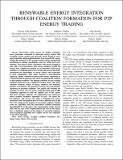Renewable energy integration through coalition formation for P2P energy trading
Date
2020-10-09Author
Yapa Bandara, Kosala
Thakur, Subhasis
Breslin, John
Metadata
Show full item recordUsage
This item's downloads: 114 (view details)
Recommended Citation
Yapa Bandara, Kosala, Thakur, Subhasis, & Breslin, John. (2020). Renewable energy integration through coalition formation for P2P energy trading. Paper presented at the IEEE 3rd International Conference on Renewable Energy and Power Engineering (REPE 2020) online conference, Edmonton, Canada, 09-11 October. doi: 10.13025/xter-y291
Published Version
Abstract
Renewable energy sources are highly unreliable;
hence prosumers connected to renewable energy sources find
unreliable energy surplus and demands which should be managed frequently within neighbourhoods. Peer-to-peer(P2P) energy
trading has emerged as the next-generation energy management
mechanism to manage unreliability concerns within local communities. This process needs a prosumer with energy demand to
join with a set of prosumers with energy surpluses to fulfil the
energy need. Finding the optimal set of prosumers with energy
surpluses is a challenge that is not yet duly addressed in literature
considering the unreliability of energy sources and constraints
in local communities. This paper presents a game-theoretic
approach, applies coalition formation game theory supported by
a clustering-based approach and solves an optimisation problem
to find optimal coalitions. The optimal coalitions are the winning
coalitions found from our coalition formation game. This game
considers frequent change of energy surpluses and demands,
distance to prosumers, the quantity of energy sale, and dynamic
clustering on potential coalitions. The payoff will calculate the
quantity of energy sale. We used a multi-threading and parallel
computing approach to find the optimal size of the cluster
that gives winning coalitions. We implemented our clusteringbased coalition formation algorithm in Java. We tested for
the efficiency and success rate using a residential PV energy
production and consumption data set from California state in the
USA. We compared the number of successful coalitions resulted
from our algorithm with the hierarchical coalition formation
algorithm(HCF) in literature. Our experimental results showed
that both the sizes of the neighbourhood and sizes of the cluster
have a significant impact on the number of successful coalitions
and the proposed algorithm has a higher success rate compared
to the HCF algorithm.


